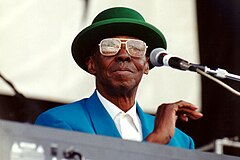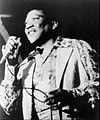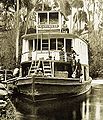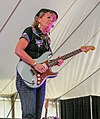The Blues Portal

Blues is a music genre and musical form that originated amongst African-Americans in the Deep South of the United States around the 1860s. Blues incorporated spirituals, work songs, field hollers, shouts, chants, and rhymed simple narrative ballads from the African-American culture. The blues form is ubiquitous in jazz, rhythm and blues, and rock and roll, and is characterized by the call-and-response pattern, the blues scale, and specific chord progressions, of which the twelve-bar blues is the most common. Blue notes (or "worried notes"), usually thirds, fifths or sevenths flattened in pitch, are also an essential part of the sound. Blues shuffles or walking bass reinforce the trance-like rhythm and form a repetitive effect known as the groove.
"The Blues" is characterized by its lyrics, bass lines, and instrumentation. Early traditional blues verses consisted of a single line repeated four times. It was only in the first decades of the 20th century that the most common current structure became standard: the AAB pattern, consisting of a line sung over the four first bars, its repetition over the next four, and then a longer concluding line over the last bars. Early blues frequently took the form of a loose narrative, often relating the racial discrimination and other challenges experienced by African-Americans.
Many elements, such as the call-and-response format and the use of blue notes, can be traced back to the music of Africa. The origins of the blues are also closely related to the religious music of the Afro-American community, the spirituals. The first appearance of the blues is often dated to after the ending of slavery, with the development of juke joints occurring later. It is associated with the newly acquired freedom of the former slaves. Chroniclers began to report about blues music at the dawn of the 20th century. The first publication of blues sheet music was in 1908. Blues has since evolved from unaccompanied vocal music and oral traditions of slaves into a wide variety of styles and subgenres. Blues subgenres include country blues, Delta blues and Piedmont blues, as well as urban blues styles such as Chicago blues and West Coast blues. World War II marked the transition from acoustic to electric blues and the progressive opening of blues music to a wider audience, especially white listeners. In the 1960s and 1970s, a hybrid form called blues rock developed, which blended blues styles with rock music. (Full article...)
Selected article -
"Cross Road Blues" (commonly known as "Crossroads") is a song written by the American blues artist Robert Johnson. He performed it solo with his vocal and acoustic slide guitar in the Delta blues style. The song has become part of the Robert Johnson mythology as referring to the place where he sold his soul to the Devil in exchange for musical genius. This is based largely on folklore of the American South that identifies a crossroads as the site where Faustian bargains can be made, as the lyrics do not contain any references to Satan.
"Cross Road Blues" may have been in Johnson's repertoire since 1932 and, on November 27, 1936, he recorded two takes of the song. One was released in 1937 as a single that was heard mainly in the Mississippi Delta area. The second, which reached a wider audience, was included on King of the Delta Blues Singers, a compilation album of some of Johnson's songs released in 1961 during the American folk music revival. (Full article...)Selected picture
Quotes
| “ | Blues is really America's finest art form and most dominant art form of the 20th century. | ” |
| — Georgie Fame | ||
| “ | Blues is a natural fact, something that a fellow lives. If you don't live it, you don't have it. | ” |
| — Big Bill Broonzy | ||
| “ | The blues is a low-down achin' heart disease Like consumption killing me by degrees. |
” |
| — Robert Johnson, "Preaching Blues (Up Jumped the Devil)" | ||
| “ | When you lay down at night, turning from one side of the bed to the other and can't sleep, what's the matter? Blues got you. | ” |
| — Lead Belly | ||
| “ | The blues had a baby and they named it rock and roll. | ” |
| — Muddy Waters | ||
Selected biography -
Charlie Patton (April 1891 (probable) – April 28, 1934), more often spelled Charley Patton, was an American Delta blues musician and songwriter. Considered by many to be the "Father of the Delta Blues", he created an enduring body of American music and inspired most Delta blues musicians. The musicologist Robert Palmer considered him one of the most important American musicians of the twentieth century.
Patton (who was well educated by the standards of his time) spelled his name Charlie, but many sources, including record labels and his gravestone, use the spelling Charley. (Full article...)General images -
Things to do
Tasks template
 |
Here are some tasks awaiting attention:
|
- –When a task is completed, please remove it from the list.
WikiProjects
Categories
Related portals
Wikimedia
The following Wikimedia Foundation sister projects provide more on this subject:
-
 Commons
Commons
Free media repository -
 Wikibooks
Wikibooks
Free textbooks and manuals -
 Wikidata
Wikidata
Free knowledge base -
 Wikinews
Wikinews
Free-content news -
 Wikiquote
Wikiquote
Collection of quotations -
 Wikisource
Wikisource
Free-content library -
 Wikispecies
Wikispecies
Directory of species -
 Wikiversity
Wikiversity
Free learning tools -
 Wikivoyage
Wikivoyage
Free travel guide -
 Wiktionary
Wiktionary
Dictionary and thesaurus
-

-

-

-

-
Random portal
Purge server cache


























































































Recent Comments